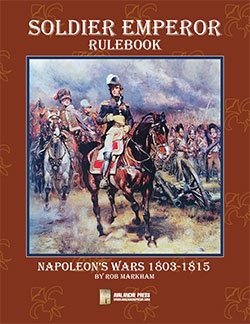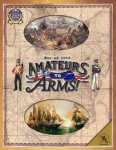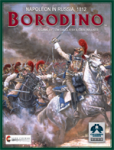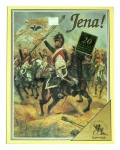-
Załączniki bezpieczeństwa
Załczniki do produktuZałączniki dotyczące bezpieczeństwa produktu zawierają informacje o opakowaniu produktu i mogą dostarczać kluczowych informacji dotyczących bezpieczeństwa konkretnego produktu
-
Informacje o producencie
Informacje o producencieInformacje dotyczące produktu obejmują adres i powiązane dane producenta produktu.Avalanche Press
-
Osoba odpowiedzialna w UE
Osoba odpowiedzialna w UEPodmiot gospodarczy z siedzibą w UE zapewniający zgodność produktu z wymaganymi przepisami.
Between 1803 and 1815, Napoleon Bonaparte lent his name to an entire age. Soldier Emperor covers the entire sweep of the Napoleonic Wars from 1803 to 1815, as fleets and armies clash from Ireland to Persia. Military, economic and political factors come together in a game playable to completion in just a few hours.
Each player has armies and fleets. There are also a handful of generals and admirals to assist these in battle and in movement. The best are Napoleon, Nelson and Wellington, standing head and shoulders above every other general. The worst is Austria's unhappy General Mack, along with the hapless Prince of Orange, Spain's arrogant Cuesta and Napoleon's profligate brother Jerome.
Players have allies; some are set at the beginning of the game, other alliances are forged during the course of play. Everyone else is an enemy. No one is “neutral”; those are just enemies you haven’t attacked yet.
The map is divided into land areas and sea zones. Armies move on land, fleets at sea. Each land area is rated for the amount of money and manpower it generates each turn. Manpower represents not just fresh recruits for your forces, but also the things made with human labor: food, uniforms, weapons and so on. Money is, well, money. You expend manpower to rebuild your forces, and money to finance their actions. Thus you need to hang on to areas that generate these resources for you, and take them from the other guy.
You do that by defeating enemy armies, and besieging enemy areas. Combat is conducted by rolling dice, one for each attack factor. These hits must be sustained by enemy armies by reducing them in strength, or eliminating them. A good general lets you roll more dice. Each area is rated for its garrison strength; to capture it, you have to defeat the garrison troops through siege (in addition to driving off any enemy armies there). The procedure here is very similar.
Throwing a twist into all of this is card play. The universe is loaded with random elements; life does not unfold as an orderly series of “phases.” After a short countdown to start the game, players can play cards at any time, in any order.
The cards (over there on the right) are the centerpiece of the game, giving it its free-wheeling nature. Dysentery can strike. Generals can vacillate. Local militia can appear to help. Soldiers might run off to loot. Bridges get burned, snow falls early, the harvests are bad, the harvests are good. Royal marriages, minor country alliances, the rise of new leaders — all sorts of events take place during card play.
Soldier Emperor includes eight scenarios plus a campaign game covering the entire era. Play ends on a pre-determined turn or when a player has achieved his or her conditions for automatic victory, whichever comes first.
The game comes in Playbook format (that is, with a book and not a box).
Contents:
- 180 ultra-thick one-inch-square tiles representing fleets and armies
- 165 regular pieces representing leaders and markers
- 64 high-quality, poker-style playing cards
- Eight full-color player aid cards (one for each player, plus one for all)
- Two-piece map, 28 inches by 40 inches
- 36-page rulebook, 16-page scenario book








